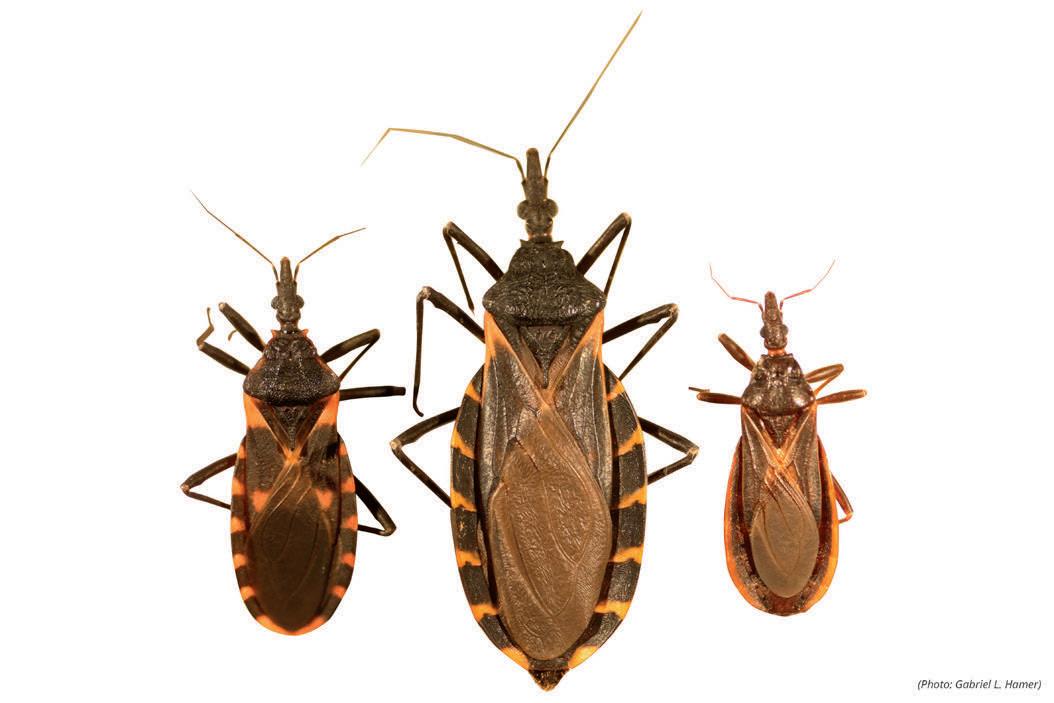
2 minute read
Wildlife Wonders
WHEN A KISS ISN’T JUST A KISS
By Cheryl Conley
Lake Creek Preserve Board of Directors

With a name like “kissing bug,” one would think the creature would be a cute, harmless, little bug, right? Au, contraire! The kissing bug, or Triatomine bug, wants your blood. These nocturnal insects get their nickname “kissing bug” because they often bite their victims near the lips, nose, or eyes. Their saliva contains a numbing compound, so often times the victim doesn’t even realize they’ve been bitten. After they “kiss” you and ingest the blood, they defecate on the person or animal. The feces can enter the body through a scratch, open wound, the mouth, nose, or eyes. If the insect is a carrier of the parasite Trypanosoma cruzi, which is only present in their feces, you may get Chagas disease, which can be fatal. Thankfully, however, not every kissing bug is a carrier. There are other ways to get infected besides being “kissed” by the bug. They include being born to a person who is infected with the parasite, eating uncooked food contaminated with feces from infected bugs, exposure through infected animals like raccoons or opossums, and through blood transfusions or organ transplants.
Chagas disease can be either acute or chronic. With the acute phase, some people are symptom-free. However, if you do experience symptoms, here’s what to look for:

• Swelling at the bite site
• Body aches
• Fatigue
• Headache
• Nausea, diarrhea, or vomiting

• Loss of appetite

Since many of the symptoms are the same as the flu, it may be hard to diagnose Chagas disease and may require multiple tests. In the acute stage, the goal of treatment would be to rid the body of the parasites. “Chagas is not something most doctors think about in the U.S.,” said Dr. Wesley Long, medical director of microbiology at Houston Methodist Hospital. Doctors are taught, “When you hear hoofbeats, think of horses, not zebras. Chagas is a zebra.”
In most cases, symptoms will subside in a few weeks, and there won’t be any permanent damage. However, if not diagnosed and treated, the disease could advance to the chronic stage, and symptoms may not appear for ten to twenty years. At this stage, it’s too late to try to kill the parasite, and treatment focuses on managing the signs and symptoms. Those symptoms include:
• Irregular heartbeat
• Heart failure
• Cardiac arrest
• Stomach pain, constipation
• Trouble swallowing due to an enlarged esophagus
Texas A&M AgriLife experts would like everyone to be aware of where you might find kissing bugs around your home.
• Beneath porches
• Under cement
• In rock, wood, or brush piles


• Rocky structures
• In chicken coops
• In outdoor dog houses or kennels
If you believe you have found a kissing bug, you may send it to the Texas A&M University Kissing Bug Citizen Science Program for free identification and testing. Contact kissingbug@cvm.tamu.edu for more information.
25

Huntsville
Herb Festival at the Wynne Home texasthymeunit.org
Piano Punch: Dueling Pianos oldtowntheatre-huntsville.org


Spring
The StepCrew cypresscreekface.org
Sugar Land
International Art and Kite Festival sugarlandtx.gov

27
Sugar Land
Astros – Space Cowboys Exhibition Game milb.com/sugar-land
28-29
College Station
“Anastasia” mscopas.org
28-Apr 4

Huntsville
365 Days/365 Plays (Full-Length) by Suzan-Lori Parks shsutickets.com
31-Apr 1
Huntsville
SHSU Bill Watrous Jazz Festival shsutickets.com
31-Apr 8
Huntsville
Walker County Fair & Rodeo walkercountyfair.com










